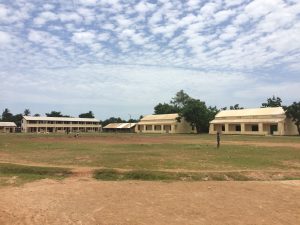One year after conducting primary research for its report Vulnerable Students, Unsafe Schools: Attacks and Military Use of Schools in the Central African Republic, Watchlist on Children and Armed Conflict visited Bangui from April 22 to May 3, 2016, to follow up on the report’s recommendations. Additionally, Watchlist gathered firsthand insights to inform the Security Council Working Group on Children and Armed Conflict just ahead of its consultations regarding the Secretary-General’s report on the situation of children and armed conflict in the Central African Republic (CAR). To this end, Watchlist met with a range of UN partners, civil society organizations, donors, and the Ministry of Education to discuss the implementation of its recommendations. Education still holds the key to successful reintegration of children affected by conflict into society and the overall transition from conflict to peace in CAR.
While peace still remains to be consolidated in CAR, Bangui’s population is eager to return to daily life. The newly elected Government is mapping out its priorities, and education is rightfully one of them.
According to a Government nationwide survey, seventy-six percent of primary schools have reopened. However, challenges still remain in ensuring the safe return of teachers and students, especially in areas still controlled by armed groups. International partners, including donors and UNICEF, are supporting light rehabilitation of schools throughout the country, as well as programs that build capacities of teachers. The UN peacekeeping force in CAR, MINUSCA, is doing its part by implementing its new directive on the protection of schools. The directive includes a clause that prohibits the military use of schools by its troops. For example, last year, Watchlist made a call to have MINUSCA re-station its troops from école Koudoukou, one of the largest public schools located in the most impacted area of the capital city Bangui. MINUSCA police officers have since been re-stationed to an alternative site and the used buildings were rehabilitated, which Watchlist visited and saw firsthand. Still, our visit to the school revealed only a partial return of students, as many families have not yet felt safe enough to return to their homes in the city. Further, some internally displaced families are still housed in the school buildings. MINUSCA officers still conduct their patrols of school property, signaling continued insecurity and vulnerability of the school grounds.
Despite these positive developments, many children and youth in the country remain out of school and without access to vocational training or livelihoods for their families. This is in large part due to the fact that secondary schools remain closed, as the focus to-date has been on the reopening of primary schools. The conflict has destroyed livelihoods, undermined social cohesion, and left boundless small weapons circulating in the communities, while vigilante groups are still engaging in petty crimes and gang activities. The safe return of vulnerable children and youth to school will harness their resilience to recruitment (or re-recruitment) and use by armed groups.
Importantly, the conflict has left a significant mark on children who have been traumatized from witnessing violence in their communities – particularly those who had been directly drawn into association with armed groups – and any future programmatic response needs to facilitate healing and reconciliation in schools, accounting for psychological scars.
Watchlist was pleased to see the recognition by the Government, civil society, and UN agencies of the importance in getting CAR’s education system off the ground, and ensuring a safe and protected environment for students and teachers to return to. Watchlist hopes that much-needed resources will back the rehabilitation of the education system in CAR. A donor conference is tentatively planned for fall 2016 in Brussels, which presents us all with an opportunity to demonstrate our support.




